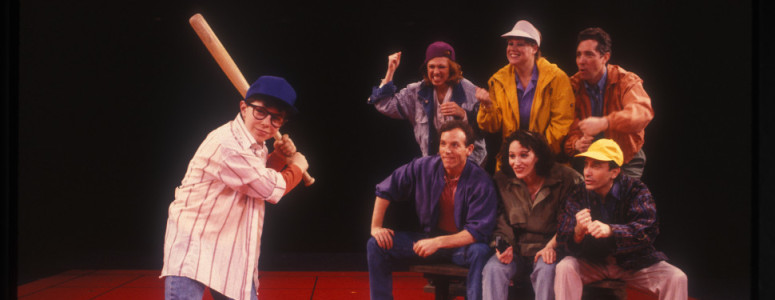Hurry, hurry, hurry! You now have little more than a month to see FALSETTOS on Broadway.
Given that it’s an almost-perfect production of a nearly-perfect masterpiece, you really should be there.
Lack of business isn’t the reason it’s closing. FALSETTOS was always scheduled as a 15-week limited engagement. Leading man Christian Borle, a two-time Tony-winner, must leave to play Willy Wonka in the upcoming CHARLIE AND THE CHOCOLATE FACTORY.
Because the original production ran 14 months, we can assume that this revival could run even longer. When it opened in 1992, we were still in an era when AIDS was a death sentence and a substantial deal of hatred for gay love followed. And while fewer will now resist a musical that has a man leaving his wife and son for another man, there are still some who won’t want to see it.
But that’s precisely what Marvin does when he abandons Trina and Jason for a stud whose name seems to be Whizzer. There’s so much contention in the show that some of the dance music should be dubbed fight music.
That changes over time.
William Finn first wrote book, music and lyrics for MARCH OF THE FALSETTOS in 1981; eight years later he envisioned what might have happened to his main characters. So he provided a score and co-wrote a book with James Lapine and called the new work FALSETTOLAND.
In 1991, Graciela Daniele joined both works in a much-acclaimed production at Hartford Stage. Everyone assumed the double-play and newly named FALSETTOS would move to Broadway. The show did, but not the Daniele version. She had to step aside so that co-author and director Lapine could do his own production.
That FALSETTOS opened the following year on Broadway and won Tonys for Best Book and Best Score. Few argued with the voters, for the musical displayed inspiration at most every turn. The way that Lapine and Finn showed us what was happening to Whizzer – as opposed to merely telling us – was especially expert.
Merging the two shows makes for one long musical of two hours and forty-five minutes. That length will be mighty refreshing to those theatergoers who feel they’re shortchanged (and short-dollared) by today’s all-too-frequent 90-minute in-and-out shows that cost much more than $90.
A theatergoer or two may still balk a bit when he sees David Rockwell has provided an economical set; it’s a modular block that splits up into various shapes and sizes. He also ordered a New York City backdrop that stretches from the Upper West Side to Battery Park; because we’re in the ‘80s, the World Trade Center is there. Rockwell would have done better to move the skyline a few blocks uptown and spare us the sad memories.
Considering that skyline, the implication is that the family lives across the river in New Jersey. It probably doesn’t, for everyone seems to be a New Yorker at heart. They learn the lesson city dwellers seem to all learn if they live here long enough: your friends become your real family. With them, you have, as we hear in A CLASS ACT, “the next best thing to love” – which still qualifies as love.
Who’d expect it from Trina (the estimable Stephanie J. Block)? She starts out spitting out Whizzer’s name in hatred, roaring to her son Jason (a brave Anthony Rosenthal) that “Daddy’s kissing boys.” She excels in “I’m Breaking Down” right down to the wonderful lyric twist at the end. Although Finn never studied under Lehman Engel, he adhered to one of the maestro’s tenets — “Look for humor in dark places” – when he wrote this darkly humorous song.
Borle does splendidly in a role that isn’t easy to play. Near the end of the first act, we come to dislike Marvin – not for coming to terms with who he is, of course, but for selfishly not wanting Trina to find happiness with someone else. That dislike turns to outright hatred and contempt when he has a Billy Bigelow moment with her. And yet, Borle manages to keep us interested in Marvin and, as the show continues, makes us begin to sympathize with him as his life turns increasingly sour.
We’ve all seen a friend get into a relationship that makes us say “What the hell could he (or she) possibly see in her (or him)?” FALSETTOS may cause you to scratch your head and wonder why Marvin fell for someone seemingly as inconsequential as Whizzer. Lyrics describe him as a “pretty boy” and Andrew Rannells’ initial lack of gravitas makes us fear that that Marvin’s head turned merely for a face, body and – as one moment implies – some solid below-the-belt credentials. Yet soon after we grouse “There’s nothing to him!” Rannells begins to show more in the second act when situations finally demand that Whizzer grow.
Tracie Thoms displays a good doctor’s concern when she realizes that “Something Bad Is Happening” to her patients. As her lover and a caterer by trade, Betsy Wolfe gets us to laugh at the delight she takes in insisting that she’s done the seemingly impossible task of making Jewish food taste as good as Italian.
Brandon Uranowitz is a complete success as Marvin’s psychiatrist Mendel. He knows how to create a genuine human being down to an eyebrow raise. He also lands the best jokes in songs, especially in the wickedly funny “Everybody Hates His Parents.”
So, to quote the title of one of FALSETTOS’ most memorable songs “What More Can I Say?” Just this: virtually every song Finn concocted for this ambitious show is equally memorable. Time’s a-wastin’, friends …




